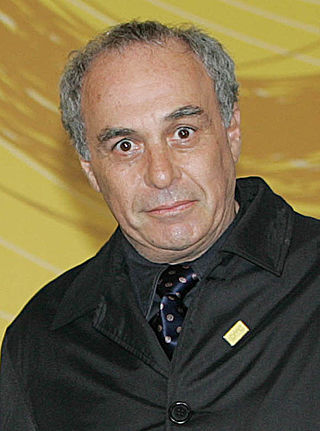A list of films produced in Brazil in 2000 (see 2000 in film):
A list of films produced in Brazil in 2000 (see 2000 in film):

Brazil, officially the Federative Republic of Brazil, is the largest and easternmost country in South America and in Latin America. Brazil is the world's fifth-largest country by area and the seventh most populous. Its capital is Brasília, and its most populous city is São Paulo. The federation is composed of the union of the 26 states and the Federal District. It is the only country in the Americas to have Portuguese as an official language. It is one of the most multicultural and ethnically diverse nations, due to over a century of mass immigration from around the world, and the most populous Roman Catholic-majority country.

Brazil is a 1985 sci-fi dystopian dark comedy film directed by Terry Gilliam and written by Gilliam, Charles McKeown, and Tom Stoppard. The film stars Jonathan Pryce and features Robert De Niro, Kim Greist, Michael Palin, Katherine Helmond, Bob Hoskins, and Ian Holm.
Brazil is the largest country in both South America and Latin America.
The year 2000 in film involved some significant events. The top grosser worldwide was Mission: Impossible 2. Domestically in North America, Gladiator won the Academy Awards for Best Picture and Best Actor. Dinosaur was the most expensive film of 2000 and a box-office success.

Black Orpheus is a 1959 romantic tragedy film directed by French filmmaker Marcel Camus, and starring Marpessa Dawn and Breno Mello. It is based on the play Orfeu da Conceição by Vinicius de Moraes, which set the Greek legend of Orpheus and Eurydice in a contemporary favela in Rio de Janeiro during Carnaval. The film was an international co-production among companies in Brazil, France and Italy.

Bruno Villela Barreto Borges is a Brazilian film director.
Cinema Novo, "New Cinema" in English, is a genre and movement of film noted for its emphasis on social equality and intellectualism that rose to prominence in Brazil during the 1960s and 1970s. Cinema Novo formed in response to class and racial unrest both in Brazil and the United States. Influenced by Italian neorealism and French New Wave, films produced under the ideology of Cinema Novo opposed traditional Brazilian cinema, which consisted primarily of musicals, comedies and Hollywood-style epics. Glauber Rocha is widely regarded as Cinema Novo's most influential filmmaker. Today, the movement is often divided into three sequential phases that differ in tone, style and content.

Nelson Pereira dos Santos was a Brazilian film director. He directed films such as Vidas Secas, based on the book with the same name by Brazilian writer Graciliano Ramos.

Tizuka Yamasaki is a Brazilian film director.

Brazilian cinema was introduced early in the 20th century but took some time to consolidate itself as a popular form of entertainment. The film industry of Brazil has gone through periods of ups and downs, a reflection of its dependency on state funding and incentives.
Pornochanchada is the name given to a genre of sex comedy films produced in Brazil that was popular from the late 1960s after popularity of commedia sexy all'italiana. By the 1980s, with the wide availability of hardcore pornography through clandestine video cassettes, the genre suffered a considerable decline. The name, combined pornô (porn) and chanchada, which itself combined comedy and erotica.
Latin American cinema refers collectively to the film output and film industries of Latin America. Latin American film is both rich and diverse, but the main centers of production have been Argentina, Brazil and Mexico. Latin American cinema flourished after the introduction of sound, which added a linguistic barrier to the export of Hollywood film south of the border.

Matheus Nachtergaele is a Brazilian actor, director, and screenwriter.

Ruy Alexandre Guerra Coelho Pereira is a Portuguese-Brazilian film director and screenwriter. Guerra was born a Portuguese citizen in Lourenço Marques in Mozambique, when it was still a Portuguese colony.
Patrick may refer to:

Zezé Di Camargo & Luciano are a famous Brazilian sertanejo/country duo. The two brothers were born in Pirenópolis, Goiás. Zezé is the artistic name for Mirosmar José de Camargo and Luciano the artistic name for Welson David de Camargo.

Andrew "Andrucha" Waddington is a Brazilian film director, producer, and screenwriter.

Júlio Eduardo Bressane de Azevedo is a Brazilian filmmaker and writer.

Breno Silveira was a Brazilian filmmaker noted for having directed Two Sons of Francisco, the highest-grossing film of 2005.